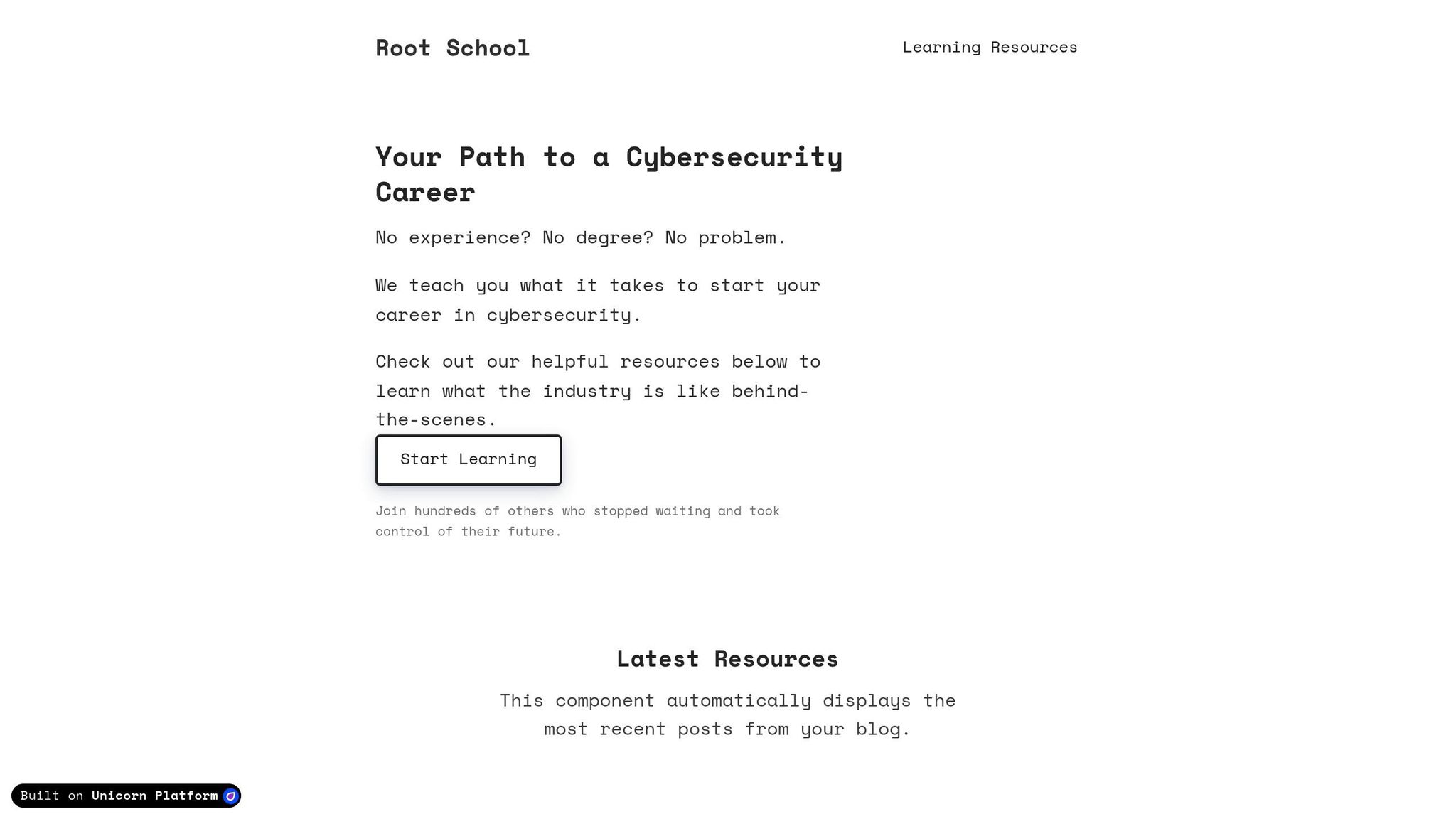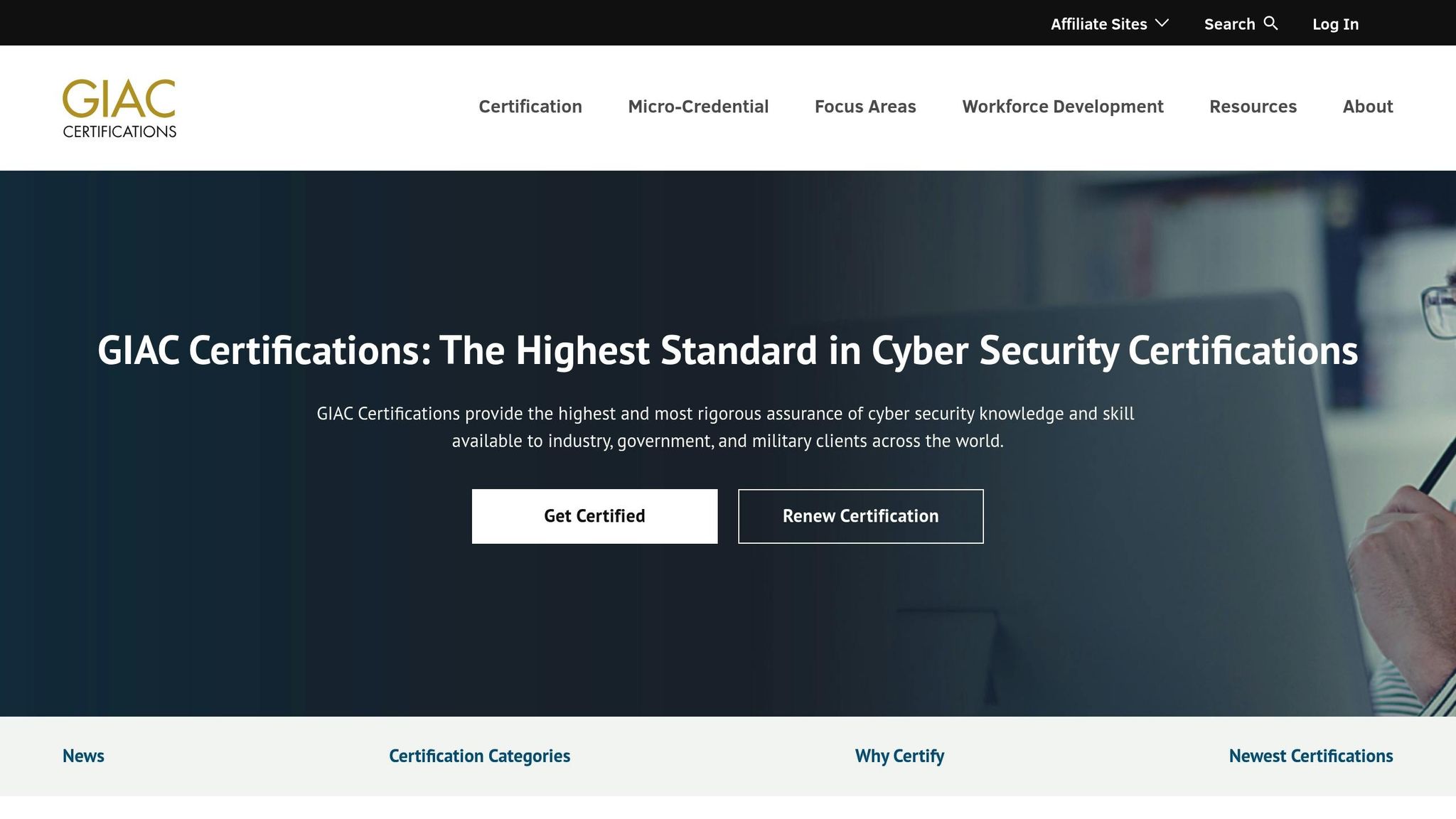The cybersecurity job market faces a massive talent shortage, leaving organizations vulnerable to evolving threats. Certifications offer a fast, targeted way to gain critical skills and break into this high-demand field. Here’s what you need to know:
- Why it matters: Overworked teams and unfilled roles increase risks like data breaches, downtime, and financial losses.
- Certifications are key: They focus on job-ready skills like threat detection, incident response, and security analysis, helping professionals quickly enter or advance in cybersecurity.
- Best options for beginners: CompTIA Security+, Google Career Certificate in Cybersecurity, and GIAC Security Essentials (GSEC) are top picks for those starting out.
Quick tip: Choose certifications based on cost, skill alignment, and career goals. For example, CompTIA Security+ is beginner-friendly, while GSEC offers advanced hands-on training. Platforms like Root School can guide you through the process, from picking the right certification to preparing for exams.
The demand for cybersecurity professionals is growing - certifications can help you fill the gap and secure a role in this critical field.
Top 5 Entry-Level Cybersecurity Certifications for Beginners in 2025!
How to Choose Cybersecurity Certifications
The right cybersecurity certification can open doors to your first role in the field. With so many options available, it’s important to remember that not all certifications hold the same value in the job market or provide the skills that employers are actually seeking.
To make the best choice, you need to understand what hiring managers prioritize and align those factors with your career goals and current skill set. Several key considerations can help you navigate this decision and set yourself up for success in cybersecurity.
Important Factors to Consider
Industry recognition is a top priority when selecting a certification. Employers tend to favor credentials from well-established organizations like CompTIA, SANS, and Google, as these are trusted for their rigorous training standards. On the other hand, certifications from lesser-known providers may not carry the same weight with recruiters.
Costs are another critical factor. Certification expenses can add up quickly, including exam fees, study materials, and potential retake costs. For example, the CompTIA Security+ exam is approximately $370, while SANS certifications can range from $7,000 to $8,000 with training included. Google’s Career Certificate in Cybersecurity, available through Coursera, costs $49 per month and typically takes 3–6 months to complete. For those on a tight budget, it’s essential to account for all associated costs, including practice tests and renewal fees.
Skill alignment with job market demands is key to landing a position quickly. Employers hiring for entry-level roles often look for candidates with skills in threat detection, incident response, and security monitoring. A quick scan of job postings in your area can help you identify which skills are most in demand for the roles you’re targeting.
Accessibility for beginners also varies widely between certifications. Some programs are designed for those with no prior IT experience, while others assume a more advanced skill set. For instance, the CompTIA Security+ certification is beginner-friendly and covers foundational topics, making it ideal for career changers. In contrast, certifications like the CISSP require five years of professional experience, making them better suited for seasoned professionals.
Don’t overlook renewal requirements and continuing education commitments. Many certifications need to be renewed every 2–3 years, either through continuing education units (CEUs) or by retaking exams. For example, CompTIA certifications require 50 CEUs every three years. Understanding these requirements upfront can help you plan for the long-term time and financial investment.
These factors can be overwhelming to navigate on your own, which is why expert resources can be incredibly helpful.
Using Resources like Root School

Platforms like Root School can simplify the process of choosing and pursuing cybersecurity certifications. They help aspiring professionals identify certifications that align with their specific career goals while addressing the skills gaps that employers care about most.
Root School focuses on the practical side of breaking into cybersecurity, going beyond simply helping you pass exams. They provide guidance on how to present your new certifications effectively to employers and highlight additional skills that can make you a standout candidate.
Their support doesn’t stop at certification advice. Root School offers preparation strategies, study resources, and career planning tips to ensure your efforts lead to real job opportunities. For those transitioning from other fields, they provide insights into how cybersecurity hiring works, helping you understand employer expectations and how to position yourself during the job search.
Additionally, Root School helps you map out realistic timelines and commitments for different certification paths. This kind of planning prevents you from overcommitting or setting unachievable goals, allowing you to create a study schedule that fits your life. With this strategic approach, you’re not just earning certifications - you’re setting yourself up for a successful career in cybersecurity while contributing to a stronger workforce in the field.
Best Entry-Level Cybersecurity Certifications
These certifications highlight the core skills employers look for in entry-level cybersecurity roles. Here’s a closer look at some of the most recommended certifications to help you start your career in cybersecurity.
CompTIA Security+

The CompTIA Security+ certification lays the groundwork for cybersecurity skills needed in roles like systems administrator and security engineer. It’s one of the most widely recognized certifications, with over 700,000 IT professionals already certified. Interestingly, about 24% of the U.S. cybersecurity workforce holds this credential, making it a strong choice for those entering the field.
CompTIA Cybersecurity Analyst (CySA+)
The CompTIA Cybersecurity Analyst (CySA+) focuses on applying behavioral analytics to networks and devices to prevent, detect, and combat cybersecurity threats. It’s a great option for those looking to specialize in threat detection and response.
GIAC Security Essentials (GSEC)

The GIAC Security Essentials (GSEC) goes beyond just understanding cybersecurity terminology. It emphasizes hands-on skills, covering areas like defense in depth, cryptography, cloud operations, and incident handling. This certification is ideal for those who want practical, real-world IT security experience.
Google Career Certificate in Cybersecurity

The Google Career Certificate in Cybersecurity is tailored for beginners, offering foundational skills in identifying and mitigating risks, threats, and vulnerabilities. It also introduces the use of AI in cybersecurity and provides hands-on experience with tools like Python, Linux, SQL, SIEM, and IDS. This program is designed to help newcomers develop practical skills to tackle modern cybersecurity challenges.
Certified Practitioner Security Analyst (CPSA)
The Certified Practitioner Security Analyst (CPSA) focuses on developing skills in security analysis and vulnerability assessments. It’s a solid choice for those aiming to specialize in identifying and addressing security weaknesses effectively.
sbb-itb-8a31326
Certification Comparison Table
Choosing the right certification can shape your cybersecurity career. Below is a breakdown of popular certifications, covering costs, experience requirements, exam details, and focus areas to help you make an informed decision.
| Certification | Cost | Experience Required | Exam Duration | Primary Focus | Best For |
|---|---|---|---|---|---|
| CompTIA Security+ | $370 | None (entry-level) | 90 minutes | Core security concepts, network security, compliance | Beginners; widely recognized in government-related roles |
| CompTIA CySA+ | $392 | 3–4 years recommended | 165 minutes | Threat detection, analysis, incident response | Aspiring SOC analysts |
| GIAC Security Essentials (GSEC) | Over $7,000 | Some IT background helpful | 5 hours | Hands-on security skills and practical application | Professionals seeking technical depth and practical training |
| Google Career Certificate in Cybersecurity | $49/month (Coursera) | None (beginner-friendly) | Project-based | Foundational skills and hands-on tools | Career changers, students, and budget-conscious learners |
| Certified Practitioner Security Analyst (CPSA) | $450 | 1–2 years IT experience | 120 minutes | Security analysis, vulnerability assessment | Those focusing on risk assessment and analysis |
Key Insights for Choosing a Certification
Cost Considerations
Certification costs vary widely. CompTIA certifications are relatively affordable, ranging from $370 to $400, while the GSEC certification costs over $7,000, reflecting its detailed and practical training. On the other hand, the Google Career Certificate offers a highly affordable option at $49/month, typically completed within 3–6 months.
Time Commitment
The time required to prepare depends on the certification. CompTIA Security+ can be achieved relatively quickly with focused study, making it ideal for those seeking a fast entry into the field. In contrast, GSEC requires a more significant time investment due to its in-depth curriculum, though its self-paced nature suits working professionals.
Career Alignment
Your career goals should guide your choice. Security+ is a great starting point for entry-level roles and is especially valued in government-related positions. CySA+ is tailored for those pursuing analyst roles, while GSEC provides a strong technical foundation for experienced professionals. The Google Career Certificate introduces modern cybersecurity tools, making it a solid choice for those entering the field or transitioning careers.
This table and the accompanying insights help you weigh your options, whether you're just starting out or looking to specialize further in cybersecurity. Use this information to make a strategic investment in your career development.
How to Bridge the Cybersecurity Skills Gap
The cybersecurity skills gap goes beyond just hiring - it’s a strategic challenge that needs a well-rounded approach. To tackle this, organizations and professionals must collaborate to develop a steady pipeline of talent capable of addressing ever-evolving cyber threats. The solution lies in combining structured learning, hands-on experience, and continuous education. These methods work hand in hand with certification paths, focusing on practical training and ongoing growth.
Using Certifications for Career Growth
Certifications are a vital stepping stone for anyone looking to enter or advance in cybersecurity. They not only provide essential knowledge but also serve as industry-recognized proof of expertise, making them an effective way to build credibility in the field.
By stacking certifications, you can create a clear and organized career path. For instance, starting with foundational certifications like CompTIA Security+ helps establish core knowledge. From there, you can pursue more specialized credentials that align with your career interests. This step-by-step approach makes your progression easy for employers to understand and value.
Certifications are especially important in government-related cybersecurity roles. Many federal contracts require specific credentials, offering immediate job opportunities to certified professionals. For example, the Department of Defense 8570 directive mandates certifications like Security+ for certain positions, making them a direct gateway to employment in these roles.
Another advantage of certifications is their efficiency. Unlike degrees, which can take years to complete, certifications can often be earned in just a few months. Programs such as the Google Career Certificate are designed for people with no prior experience, offering a quick entry point into the cybersecurity field.
The real key is aligning your certifications with your career goals. For example, if you’re aiming for a SOC analyst role, a credential like CySA+ is highly relevant. On the other hand, if you’re interested in practical, hands-on security work, something like GSEC might be a better fit. This strategic approach ensures you get the most value from your certification efforts.
Hands-On Training and Mentorship
While certifications provide the theoretical foundation, hands-on experience is what truly develops the skills employers are looking for. This is where many aspiring cybersecurity professionals hit a roadblock - certifications alone aren’t enough to land that first job.
Practical experience can be gained through tools like cyber ranges, virtual labs, or even personal home labs. These environments allow you to practice real-world scenarios like incident response, threat hunting, and security analysis in a safe setting. The skills you develop through these simulations directly translate to the demands of cybersecurity roles.
Mentorship also plays a crucial role in skill-building. Experienced professionals can offer guidance that goes beyond what certifications teach, helping newcomers understand how to apply their skills in real-world situations. Many successful cybersecurity professionals credit mentorship for helping them navigate the early stages of their careers.
Local cybersecurity groups and professional organizations are great places to find mentors. These relationships often extend beyond landing a first job, providing ongoing support and advice as you advance in your career. Together, hands-on training and mentorship are critical for closing the skills gap in cybersecurity.
Continuous Learning with Root School
Cybersecurity is a fast-moving field where continuous learning isn’t optional - it’s essential. Threats evolve, tools get updated, and compliance requirements shift. Staying current is the only way to remain effective in this industry. While hands-on practice and mentorship build immediate skills, continuous learning ensures you’re ready for long-term challenges.
Root School is a platform designed to support this ongoing learning while helping aspiring professionals launch their cybersecurity careers. It recognizes that breaking into this field requires more than technical knowledge - it also involves understanding industry expectations, interview preparation, and career planning.
For career changers, this kind of support is especially valuable. Root School helps professionals leverage their existing experience while building the cybersecurity skills they need to stand out. This approach makes it easier for career changers to compete with candidates who have traditional cybersecurity backgrounds.
The platform also complements certification learning by offering practical job search strategies. For instance, it helps users identify roles that match their certification levels, tailor their resumes specifically for cybersecurity, and prepare for technical interviews. These insights make a big difference when launching a career in cybersecurity.
Conclusion
The cybersecurity skills gap is one of the most urgent challenges organizations face today. With over 3.5 million cybersecurity positions unfilled globally since 2023 - and projections indicating this gap may persist through 2025 - the demand for effective solutions has reached a critical point. Addressing this issue requires a well-rounded strategy that combines certifications, hands-on training, and a commitment to lifelong learning.
Certifications have proven to be an effective way to equip professionals with the specialized skills needed to combat evolving cyber threats. Their appeal lies in their efficiency; many certification programs can be completed in just a few months, enabling individuals to enter the workforce quickly and with targeted expertise.
The urgency of the situation is underscored by labor market trends. The US Bureau of Labor Statistics forecasts a 31% growth in cybersecurity jobs by 2029, far outpacing the national average. As a result, more organizations are shifting their focus from traditional degrees to candidates with certifications and practical credentials to address workforce shortages.
However, certifications alone are not enough. The most effective solutions integrate certifications with hands-on training and ongoing education. The fast-changing nature of cyber threats - highlighted by the disclosure of over 8,000 vulnerabilities in 2020 alone - makes continuous learning essential for staying relevant in the field.
The impact of comprehensive training is clear. For instance, a survey revealed a 70% drop in phishing incidents after implementing continuous training programs. Similarly, 83% of EC-Council University alumni reported benefiting from iLabs, which provide simulated, real-world environments for practical learning.
For those entering the cybersecurity field, the roadmap is straightforward: begin with foundational certifications like CompTIA Security+, gain practical skills through lab simulations, and remain committed to ongoing education. While the cybersecurity skills gap is substantial, a combination of certifications, hands-on training, and continuous learning can help build the skilled workforce necessary to protect our increasingly digital world.
FAQs
How can I choose the right cybersecurity certification for my career goals and skills?
Choosing the right cybersecurity certification depends on where you are in your career and where you want to go. If you're just starting out, entry-level certifications like CompTIA Security+ or Certified Ethical Hacker (CEH) can give you a solid foundation to build on. On the other hand, if you're an experienced professional, certifications like CISSP or CISM are geared toward helping you step into leadership positions or more specialized roles.
Think about the type of role you're aiming for - whether it's hands-on technical work, a managerial position, or a niche area like cloud security or incident response. Picking certifications that align with your career goals will not only enhance your skills but also make you more noticeable to potential employers. Taking a close look at job postings for roles you're interested in can also help you identify which certifications are most sought after.
What are the costs and time commitments involved in earning a cybersecurity certification?
The price tag for earning a cybersecurity certification in the U.S. can vary quite a bit. Exam fees alone can range from as little as $50 for renewals to over $1,200 for more advanced certifications. On top of that, training courses designed to help you prepare for these exams often cost between $850 and $3,500, depending on the certification type and the training provider.
When it comes to time, the commitment largely depends on the certification you’re pursuing and how much prior knowledge you bring to the table. Many professionals spend several months studying, while certifications tied to degree programs can take anywhere from 2 to 4 years to complete. On average, expect to invest a significant amount of study time to set yourself up for success.
Why is hands-on experience essential in cybersecurity, and how can I build it while earning certifications?
Hands-on experience is essential in cybersecurity as it bridges the gap between theory and practice. It equips you with the ability to tackle real-world threats effectively while sharpening critical thinking and problem-solving skills - things that textbooks alone can't fully teach.
To build this practical expertise while pursuing certifications, dive into virtual labs, cybersecurity simulations, and hands-on training exercises. These tools let you test and refine your skills in safe, controlled environments, giving you a taste of the challenges you’ll face in the field. Plus, many certification programs integrate practical components, ensuring you apply what you learn in meaningful ways.


